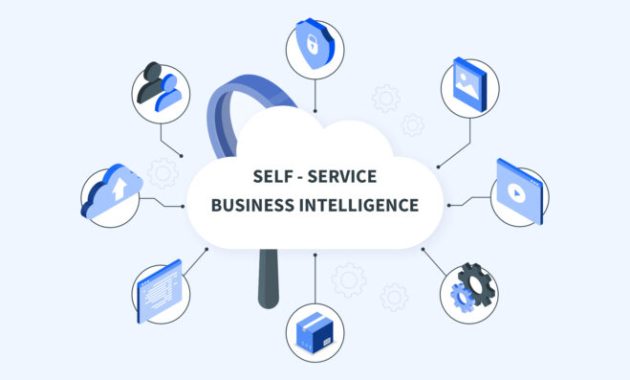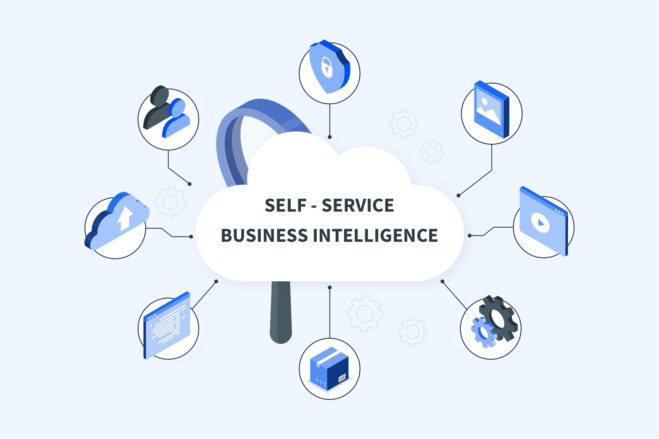
Self-Service Business Intelligence Software: A Revolution in Decision-Making
The modern business landscape is awash in data. Companies generate, collect, and store more information than ever before. The challenge, however, lies not in accumulating data, but in harnessing its power. This is where self-service business intelligence (BI) software steps in, transforming raw data into actionable insights. This article delves into the world of self-service business intelligence software, exploring its benefits, features, and impact on decision-making processes. It analyzes how organizations of all sizes can leverage these tools to gain a competitive edge. We will explore the key features, best practices, and real-world examples, all aimed at helping you understand and implement self-service business intelligence software effectively.
Demystifying Self-Service Business Intelligence
At its core, self-service business intelligence software empowers business users to analyze data without relying on IT or data science departments. Traditionally, accessing and interpreting data required specialized skills and often involved lengthy processes. Self-service BI breaks down these barriers, providing user-friendly interfaces and intuitive tools. This allows individuals across the organization to extract insights, create reports, and build dashboards. This rapid access to information fosters a data-driven culture, where decisions are based on evidence rather than intuition.
This democratization of data analysis is a significant shift. It allows departments like marketing, sales, finance, and operations to independently explore their data. It also speeds up the decision-making process. Instead of waiting for IT to generate reports, users can access the information they need in real-time. This agility is critical in today’s fast-paced business environment.
Key Features to Look For in Self-Service BI Software
Choosing the right self-service business intelligence software is crucial. Several features are essential for maximizing its effectiveness. When evaluating different platforms, consider the following:
- Data Connectivity: The ability to connect to various data sources is paramount. This includes databases, cloud services, spreadsheets, and other data repositories. The software should support a wide range of connectors to ensure seamless data integration.
- Data Visualization: Powerful visualization tools are essential for transforming data into understandable formats. The software should offer a variety of chart types, graphs, and dashboards. These tools help users identify trends, patterns, and anomalies quickly.
- Data Preparation: Data often needs cleaning and transformation before analysis. The software should provide tools for data cleansing, filtering, and aggregation. This ensures the data is accurate and ready for analysis.
- User-Friendly Interface: The interface should be intuitive and easy to navigate. It should require minimal technical expertise. The goal is to empower business users to analyze data without needing specialized training.
- Reporting and Dashboarding: The ability to create custom reports and interactive dashboards is crucial. These reports should be easily shareable and customizable to meet specific needs.
- Collaboration Features: The software should facilitate collaboration among team members. This includes features like commenting, sharing dashboards, and real-time data updates.
- Mobile Access: In today’s mobile world, access to data on the go is essential. The software should offer mobile apps or responsive web designs. This allows users to access insights from anywhere, at any time.
- Security and Governance: Data security is a top priority. The software should provide robust security features to protect sensitive information. This includes user access controls, data encryption, and compliance with relevant regulations.
Benefits of Implementing Self-Service BI
The advantages of using self-service business intelligence software are numerous. Organizations that adopt these tools often experience significant improvements in several areas:
- Improved Decision-Making: By providing access to real-time data, self-service BI empowers users to make more informed decisions. This leads to better outcomes and improved business performance.
- Increased Efficiency: Automating data analysis and reporting tasks frees up IT and data science teams to focus on more strategic initiatives. This leads to significant time and cost savings.
- Enhanced Collaboration: Self-service BI fosters collaboration by providing a shared platform for data analysis and reporting. This improves communication and alignment across teams.
- Greater Agility: The ability to quickly access and analyze data allows organizations to respond rapidly to changing market conditions. This agility is crucial for staying competitive.
- Reduced Costs: By empowering business users to analyze data independently, organizations can reduce their reliance on external consultants and specialized data analysis services.
- Data-Driven Culture: Self-service BI promotes a data-driven culture. It encourages employees to base their decisions on evidence rather than intuition. This leads to a more analytical and informed workforce.
Real-World Examples: How Businesses are Leveraging Self-Service BI
Many organizations across various industries are successfully using self-service business intelligence software. Here are a few examples:
- Retail: Retailers use self-service BI to analyze sales data, identify customer preferences, and optimize inventory management. They can track key performance indicators (KPIs). They can also personalize marketing campaigns.
- Healthcare: Healthcare providers use self-service BI to analyze patient data, monitor treatment outcomes, and improve operational efficiency. They can also identify areas for improvement.
- Finance: Financial institutions use self-service BI to analyze financial data, detect fraud, and manage risk. They can also improve customer service.
- Manufacturing: Manufacturers use self-service BI to analyze production data, optimize supply chains, and improve product quality. They can also reduce operational costs.
- Marketing: Marketing teams use self-service BI to analyze campaign performance, track website traffic, and understand customer behavior. They can also optimize marketing spend.
Best Practices for Successful Implementation
Implementing self-service business intelligence software requires careful planning and execution. Here are some best practices to ensure a successful implementation:
- Define Clear Objectives: Before implementing any software, define your business goals and objectives. Identify the key metrics and KPIs you want to track.
- Choose the Right Software: Select software that meets your specific needs and requirements. Consider factors like data connectivity, visualization capabilities, and user-friendliness.
- Provide Training and Support: Offer comprehensive training to users to ensure they can effectively use the software. Provide ongoing support to address any questions or issues.
- Establish Data Governance: Implement data governance policies to ensure data quality and security. This includes defining data standards, access controls, and data validation processes.
- Start Small and Scale Up: Begin with a pilot project to test the software and identify any potential challenges. Gradually expand the implementation across the organization.
- Promote a Data-Driven Culture: Encourage the use of data in decision-making across all departments. Celebrate successes and share insights to foster a data-driven culture.
- Regularly Review and Optimize: Continuously monitor the performance of the software and make adjustments as needed. Regularly review your data analysis processes.
The Future of Self-Service BI
The future of self-service business intelligence software is bright. As technology advances, we can expect to see several trends:
- Increased Use of Artificial Intelligence (AI) and Machine Learning (ML): AI and ML will play a larger role in automating data analysis and providing predictive insights.
- Greater Integration with Cloud Services: Cloud-based BI platforms will become even more prevalent. They will offer greater scalability and flexibility.
- Improved User Experience: The user interface will become even more intuitive and user-friendly. This will further empower business users.
- Enhanced Data Security and Privacy: Data security and privacy will remain a top priority. We can expect to see more advanced security features.
- Rise of Embedded BI: BI capabilities will be embedded into other business applications. This will make data analysis more accessible.
Self-service business intelligence software is no longer a luxury. It is a necessity for organizations that want to thrive in today’s data-driven world. By empowering business users to analyze data independently, organizations can improve decision-making, increase efficiency, and gain a competitive edge. By choosing the right software and following best practices, organizations can unlock the full potential of their data. This will lead to better business outcomes.
Embracing self-service business intelligence software is not just about adopting a new technology. It is about embracing a new way of thinking and working. It is about empowering your employees to make data-driven decisions. This leads to greater success. Consider how self-service business intelligence software can transform your business today.
[See also: Related Article Titles]

